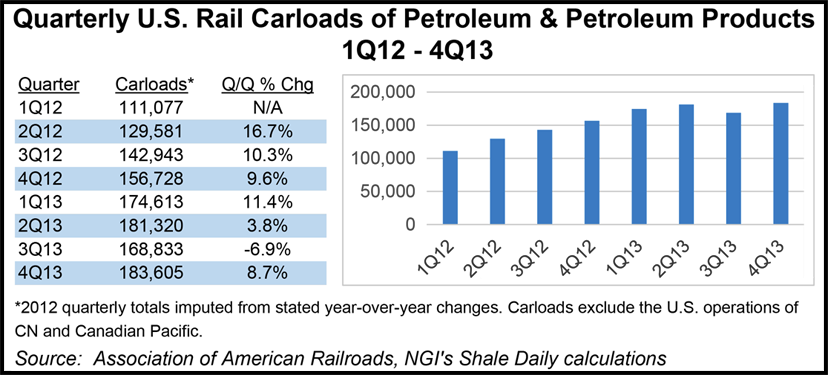Bakken Shale | E&P | NGI All News Access | NGI The Weekly Gas Market Report
Tank Car Explosions Spur Federal Alert on Bakken Crude
The federal Pipeline and Hazardous Materials Safety Administration (PHMSA) on Thursday issued a safety alert on Bakken crude oil, warning emergency responders, the public and others that the light, sweet crude may be more flammable than traditional heavy crude oil.

PHMSA’s alert stems from preliminary inspections conducted after last Monday’s derailment and the resulting explosion of several crude oil tank cars in Casselton, ND, as well as derailments in Alabama and Quebec during the last half of 2013. Those investigations have prompted the agency to reinforce the requirement to “properly test, characterize, classify and degasify hazardous materials prior to shipping.”
No one was injured in the latest crude oil railroad tank car accident in North Dakota, but it has prompted state and federal officials to reiterate the need for further research into the explosions, given the fact that crude oil is not supposed to be explosive. Multiple 100-tank-car trains travel daily from the Bakken to markets across the country.
The derailment of up to nine tank cars near Casselton, ND, involving a BNSF train carrying crude oil (see Shale Daily, Dec. 31, 2013) is one of several rail crude incidents in the past six months, and all of them have involved explosions, state and federal energy regulators are pointing out.
On Thursday, the federal investigation in North Dakota continued but the fires and evacuations that characterized the pre-New Year’s Day incident were over, a spokesperson for the North Dakota Department of Emergency Services (DES) told NGI‘s Shale Daily. “All fires are out, the evacuation advisory has been lifted, and the tracks are open,” said DES’s Cecily Fong.
BNSF reported on Thursday that one main track opened at 3 a.m. CST, and the second main track opened at 3:15 a.m. “Customers may experience delays of 24 to 36 hours on shipments moving through this corridor,” a spokesperson said.
PHMSA’s alert said it was notifying “the general public, emergency responders and shippers and carriers that recent derailments and resulting fires indicate that the type of crude oil being transported from the Bakken region may be more flammable than traditional heavy crude oil.
“Based upon preliminary inspections conducted after recent rail derailments in North Dakota, Alabama and Lac-Megantic, Quebec involving Bakken crude oil, PHMSA is reinforcing the requirement to properly test, characterize, classify, and where appropriate sufficiently degasify hazardous materials prior to and during transportation.”
The latest advisory is a follow-up to a PHMSA and Federal Railroad Administration (FRA) joint safety advisory published Nov. 20 last year [78 FR 69745].
The FRA is investigating the circumstances of each recent incident, according to a spokesperson in the North Dakota Department of Mineral Resources (DMR), who noted, however, that the federal agency has not contacted the state agency.
“[DMR Director] Lynn Helms had agreed prior to the latest derailment that some sort of study [on Bakken crude properties] was needed,” the spokesperson said.
PHMSA said that the quality of light sweet crude oil from the Bakken should be categorized in a group of products that have a low boiling point.
“This means the materials pose significant fire risk if released from the package in an accident,” the agency said.
A derailment of a train carrying Bakken oil into Canada last July caused explosions and fires that decimated portions of the town of Lac-Megantic, causing at least 42 deaths (see Shale Daily, July 9, 2013).
© 2024 Natural Gas Intelligence. All rights reserved.
ISSN © 2577-9877 | ISSN © 1532-1266 | ISSN © 2158-8023 |
